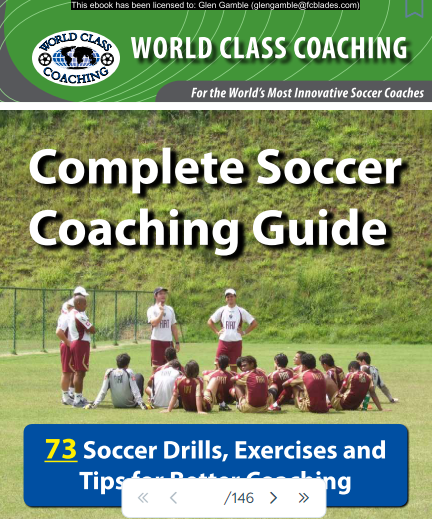73 Soccer Drills, Exercises and Tips for Better Coaching PDF
As coaches, we know that there are many things that contribute to a young soccer player’s success.
Our job becomes one of identifying where individual players ( as well as our team) are at in terms of their developmental abilities and then choosing the right activities to help them improve their skills.
When I say “good activities” I mean ones that are fundamentally sound, keep the kids moving, develop good habits, and make them think about the game as a whole.
This book provides you with 180 activities designed to work on warmingup, dribbling, passing, receiving, communicating, spacing, supporting, possessing, passing, conditioning, heading, goal keeping, finishing, defending, offending, and many other techniques and tactics.
I feel these activities are suitable because they’ve been tried and tested by many soccer coaches and teams.
You’ll notice that this is a collection of material gathered from my experience as a coach, my summer soccer camp experiences, talking with other coaches, and from coaches who subscribe to my soccer newsletter available at finesoccer.com.
In addition to specific drills, there are many activities designed to be used as scrimmages at the end of practice.
I highly recommend spending some time during or towards the end of your practice to play games that include the skills your players were working on.
The kids will have more fun and you will be surprised at how the carry over from practicing these skills in a small or adapted version of the game improves the players overall real soccer game performance.
I hope you find these activities helpful, fun, and effective in achieving your desire to have the best team you can have.
As you begin to try them, I would enjoy hearing your feedback regarding which ones you found most helpful as well as the ones the kids liked to do the most.
To make the most of practice time, getting organized quickly for drills is essential.
One thing I’ve noticed is that when players are asked to get into small groups for a particular activity friends will always look for friends to practice with, while some of the kids are left out or left to be assigned to groups by the coach.
Because I strongly believe that all players should feel a part of the team, here is a trick I use to get going quickly and to build team unity at the same time.
I call this method the numbers game.
I use it as a season long game. Whenever I call out a number, the players must get into groups of that number as soon as possible.Whoever isn’t in a group “loses”.
For example, if there are 16 players at the training session and I call out “4” the players will quickly get into 4 groups of 4.
However, if I call out 3, they will get into 3 groups of 5 and one person “loses.”
When I first introduce the game, I give the kids some examples of consequences for the loser.
For example, she might have to do 5 push-ups or 5 donkey kicks.
Players learn very quickly that whenever they hear me call out a number that they need to grab whomever is closest to them without regard for whether they are an old friend or a new friend.
This is also a great way to get players to work together with different teammates throughout a training session or season.
It even works in large numbers ( if you want to split 16 players into groups of 11 and 5, just yell 11 and those 11 become the first group right away.
If a player wants to be in the group of 11 they will do so and if they don’t that is her decision.
This is a great way to find out who wants to do things because the players will frequently figure out what you are thinking with the numbers and will get into the bigger group to participate.
Sometimes I will assign players into groups, but most often I will yell out the number and let the players do it, which saves time and avoids potential conflicts.
Next time you need to break your players into teams, play the numbers game and see how many potential problems are avoided.


Post a Comment